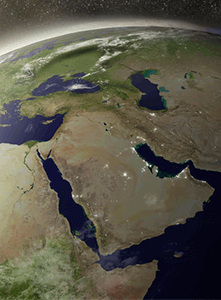
Middle East and North Africa (MENA) IT spending is projected to reach $155.8 billion in 2017 a 2.4 percent increase from 2016, according to the latest forecast by Gartner, Inc.
Gartner analysts are discussing the key IT and business issues that are driving the evolution of digital business this week during Gartner Symposium/ITxpo here through Thursday. Analysts said the key vertical segments driving IT spending growth include the communications, media and services, banking and securities, manufacturing and utilities markets.
The devices segment will represent nearly 17 percent of total IT spending in 2017 (see Table 1), This market is expected to grow 4 percent this year, mainly due to a strong increase in mobile phone expenditure. Other devices (which include PCs) are forecast for negative growth.
Data center systems will see an overall growth of 6 percent in 2017, versus flat performance in 2016, due to increase in demand for servers and unified communications. Software spending is forecast to increase 9 percent, with enterprise application software projected to grow 13 percent and infrastructure software spending to increase 6 percent.IT services will post 4 percent growth, with business IT services reaching nearly 5 percent growth this year. Consumer mobile services will represent close to 60 percent of the total expenditures in communication services.
‘The MENA region is moving in the right digital direction, where demand for the latest and most emerging technologies like Blockchain will continue to reflect the profound changes the IT markets are experiencing. The growing and influential role of business leaders toward embracing technologies and processes such as cloud, business intelligence (BI), analytics, customer relationship management (CRM), digital business and marketing, are contributing to fuel digital transformation,’ said Peter Sondergaard, senior vice president and global head of Research at Gartner.
‘A new type of infrastructure needs to be built that is not just going to reshape business, but also the way people live. CIOs are the builders of this infrastructure, which Gartner calls the ‘civilization infrastructure’,’ said Mr. Sondergaard. ‘Middle East user organizations must realize the next evolution of digitalization is here: the rise of the digital ecosystem ‘ where enterprises, competitors, customers, regulators and other stakeholders form an interdependent business network.’
CIOs will participate in the building of a new digital platform with intelligence at the center. That platform will enable ecosystems, connecting businesses and collapsing industries. Gartner analysts said it will change society itself, and the way people live.
The new digital platform consists of five domains: traditional IT systems, customer experience, The Internet of Things (IoT), an ecosystem foundation and the intelligence platform that ties all the domains together.
‘Each of these domains are interconnected and interdependent. All have a role, and all are required,’ said Mr.Sondergaard. ‘Your new digital platform will allow you to participate in the evolving world of business, government, and consumer ecosystems. Because ecosystems are the next evolution for digital. It’s how you compete at scale.’
Further insight into the five elements of the new digital platform include:
Traditional core IT systems. This is how CIOs run and scale operations. It’s building on what’s already been built. It’s taking high performing traditional IT systems (such as the data centers and networks) and modernizing them to be part of the digital platform.
For example, leading organizations are halfway through the transition to the cloud. It started with Sales and Marketing, and now half of sales-support capabilities are in the cloud. This migration will continue through the end of the decade into functions such as HR, procurement and financial management.
‘You now need to make cloud, mobile, social and data your core capabilities while investing in resilience, business continuity and disaster recover, insight and outside in a hybrid approach,’ Mr. Sondergaard said.
Customer experience. This is how CIOs connect and engage in new ways. The digital customer experience may be the only one that the customers have. This is how the business engages in the digital world. The pioneers are exploring how new experiences such as virtual and augmented reality will change the way customers engage.
In the world of chatbots and virtual personal assistants (VPAs), your mobile apps, and even your web presence, will be much less relevant. The new competitive differentiator is understanding the customer’s intent through advanced algorithms and artificial intelligence. Creating new experiences that solve problems customers didn’t realize they had.
The Internet of Things (IoT). This is how the organization senses and acts in the physical world. Adding devices to the IoT domain is the easy part. Processes, workflows, and data integration are much harder. In fact, two-third of organizations have had to rework their existing IT systems to accommodate IoT.
IoT also changes how CIOs should invest in analytics because decisions must move from days to minutes to instant. CIOs should plan to shift their investments in analytics to real-time. Real-time analytics will outpace traditional analytics by a factor of three by 2020 to become 30 percent of the market.
Intelligence. This is how the systems analyze, learn and decide independently. CIOs start with traditional data management, data science and data intelligence. Algorithms determine the action. The new type of intelligence, driven by machine learning is artificial intelligence.
‘We are building machines that learn from experience and produce outcomes their designers did not explicitly envision. Systems that can experience and adapt to the world via the data they collect,’ Mr. Sondergaard said. ‘Machine learning and artificial intelligence move at the speed of data, not at the speed of code releases. Information is the new code base.’
Ecosystem Foundation. This is how the enterprise interacts as an institution in the digital world. Ecosystems go beyond the capability to decide, CIOs need to build the capability to interact with customers, partners, adjacent industries, even your competitors. The ecosystems allow for the transformation from traditional business with linear value supply chains to networked digital ecosystem businesses.
Many industry models will transform with digital ecosystems. Moving from simple relationships run by intermediaries toward distributed partnerships possibly managed by a shared distributed ledger system like blockchain. Building a strong ecosystem will help you manage these dynamic interactions. Ecosystems are the future of digital.
Gartner analysts are examining key industry trends during Gartner Symposium/ITxpo 2017 in Dubai, 28 February ‘ 2 March. For further information about the event in Dubai, please visit https://www.gartner.com/events/emea/dubai-symposium. Members of the media can register for the event by contacting Sony Shetty at [email protected].
About Gartner Symposium/ITxpo
Gartner Symposium/ITxpo is the world’s most important gathering of CIOs and other senior IT executives. This event delivers independent and objective content with the authority of the world’s leading IT research and advisory organization, and provides access to the latest solutions from key technology providers. Gartner’s annual Symposium/ITxpo events are key components of attendees’ annual planning efforts. IT executives rely on these events to gain insight into how their organizations can use IT to overcome business challenges and improve operational efficiency.






















